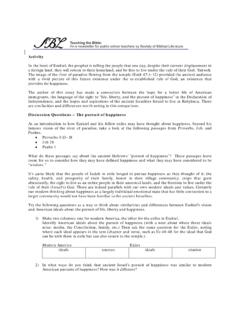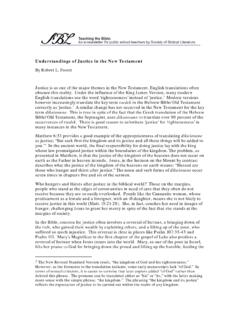Transcription of The Character of King David
1 The Character of king DavidAuthor(s): J. M. P. SmithReviewed work(s):Source: Journal of Biblical Literature, Vol. 52, No. 1 (Apr., 1933), pp. 1-11 Published by: The Society of Biblical LiteratureStable URL: .Accessed: 09/04/2012 11:43 Your use of the JSTOR archive indicates your acceptance of the Terms & Conditions of Use, available at . is a not-for-profit service that helps scholars, researchers, and students discover, use, and build upon a wide range ofcontent in a trusted digital archive. We use information technology and tools to increase productivity and facilitate new formsof scholarship. For more information about JSTOR, please contact Society of Biblical Literature is collaborating with JSTOR to digitize, preserve and extend access toJournal of Biblical Character OF king DAVIDI tJ.
2 M. P. SMITH UNIVERSITY OF CHICAGO THE Character of David as presented in the Old Testament is rather hard to determine. He has been so greatly magnified by the Chronicler and by the Psalter that it is difficult to believe all that they say about David . If it were all true, we should have to deal with a most complex and contradictory personality. The oldest and most reliable story about David is found in I Sam. 16 1 to 31 13, which continues through the whole of II Samuel, and concludes in I Kings 1 1-2 11. Even this narrative was not con- temporaneous with David , but originated a century or two after his day. Therefore it probably praises him unduly, and must be discounted quite a little. But this paper will accept practically most of its statements at their face value.
3 We first encounter David as a lad in his father's home at Bethlehem, where Samuel anointed him king over Israel (I Sam. 16 1-13).2 A little later on he is called in to relieve Saul's insanity by playing the lyre and is appointed Saul's armour-bearer (I Sam. 16 14-23).3 His next appearance is in Saul's camp when Israel is fighting the Philistines. On this occasion occurs the incident of the 1 Prepared as a Presidential Address by Professor Smith before his death, this communication was read to the Society from the manuscript by Pro- fessor W. C. Graham. 2 The narrative is a part of a late element in Samuel originating not earlier than the middle of the 7th century ; Wellhausen, Kuenen, Laihr, Kennedy; contra Batten. 3 This narrative is part of one of the earlier sources of Samuel; so Budde, Kennedy, and Batten.
4 2 JOURNAL OF BIBLICAL LITERATURE famous fight with Goliath who is slain by a stone from David 's sling. This is certainly a deed combining both courage and skill. But the record is subject to considerable doubt. David was only a youth at this time, with no experience in the art of war. Hence his volunteering to meet the giant in battle would have been an act of unparalleled daring. In view of this marked tendency to glorify David in all the records it is quite possible, if not probable, that this record is a product of the same tendency and is not based upon historical fact. This point of view is rendered even more plausible by the fact that in II Sam. 21 19, Goliath is said to have been slain by "Elhanan, the son of Jair,4 the Bethlehemite." Most scholars accept this later statement and regard the name Goliath as a later addition to the David -story of the slaying of the giant.
5 Even if David did not slay Goliath, he probably did slay some unnamed giant and thus laid the foundation of his reputation for heroic The next story regarding David reports the beginning of his intimate friendship with Jonathan, Saul's son (I Sam. 18 1-5). This is followed by the record of the praise sung by groups of women as David returned from campaigns against Israel's enemies: "Saul has slain his thousands, But David his tens of thousands." (I Sam. 18 6-9) This sort of thing aroused the jealousy of Saul who thereupon made various attempts to take David 's life. One of these schemes was to make David the king 's son-in-law on condition that he should first slay a hundred Philistines. This David accomplished and thus made Saul more hostile to him than ever (I Sam.)
6 18 20-28). Jonathan's friendship now stood David in good stead, and served to save his life two or three times over. On one of these occasions David conspires with Jonathan in telling Saul a lie (I Sam. 20 29). Lying was one of David 's foremost devices in getting himself out of difficulties. David straightway flees from Saul and on his way to Gath in Philistia he stops at Nob with Ahimelech, priest of the sanctuary 4 The Hebrew text says "Jaare oregim," but the "oregim" is probably an error, having crept in from the line below. 5 So Kennedy, Batten, et al. SMITH: THE Character OF king David 3 there. Now he tells another lie to Ahimelech, through which false pretenses he obtains food and weapons from Ahimelech (I Sam. 21 1-9). This help given by Ahimelech to David was reported by Doeg, the Edomite, to Saul who thereupon ordered the slaughter of all the priests at Nob, a total of 85 men, and all of the citizens of the town.
7 When this was told to David he said, "I knew that day, because Doeg the Edomite was there, that he would surely tell Saul. I myself am guilty of all the lives of your father's house." And yet he lied to Ahimelech notwithstanding; and so deceived him into helping him at the cost of his life. Having arrived at Gath, he discovers that Achish, its king , is hostile to him and intends to kill him. Thereupon David enacts another lie. He plays the part of a madman and so saves his life (I Sam. 10-13).6 Evidently in those days insanity was looked upon as due to possession by an evil spirit; and it was regarded as dangerous for anyone to lay hands upon an insane person lest thereupon the evil spirit might leave the madman and take possession of his assailant. Hence David was enabled to escape from Gath, and fled to the cave of Adullam.
8 Saul chases him from place to place, till one night Saul and his men sleep in the cave that is already occupied by David and his men, but Saul is not aware of David 's presence. During the night David secretly cuts off a piece of Saul's robe, and in the morning waves it before Saul's eyes as he is departing and through it comes to an agreement with Saul, ratified by an oath, that he will not destroy Saul's descendants (I Sam. 24 1-24). This episode reveals another phase of David 's Character . He had Saul at his mercy; Saul was con- stantly trying to kill him; why did he not slay Saul when he had the chance and so rid himself of trouble and danger ? There are two answers to this question. First, Saul was his father-in-law and the father of his dear friend Jonathan hence he shrinks from killing him.
9 Secondly, Saul was Yahweh's Anointed; therefore he dare not lay hands upon him, he is even conscience-smitten because he has ventured to cut off the skirt of Saul's mantle (I Sam. 24 5).7 6 This is clearly a later addition; note that David is called in v. 11 "the king of the land." ' Budde regards the oath sworn by David , that he will not harm Saul's descendants, as a later redactor's note. 4 JOURNAL OF BIBLICAL LITERATURE The next episode recorded in David 's life is the story of the raid upon Nabal (I Sam. 25 1-43). David hears that Nabal is shearing his sheep and giving a feast to his shepherds. He therefore sends messengers to Nabal reminding him that neither sheep nor shep- herds have suffered at his hands and pleading for some gift in recognition of David 's kindly protection.
10 Nabal, however, resents their petition and sends them away empty-handed. David there- upon arms his 400 men and sets out to raid the home of Nabal. But Abigail, the wife of Nabal, went out to meet David and his men, taking with her "two hundred loaves of bread, two skins of wine, five dressed sheep, five measures of parched grain, a hundred bunches of raisins, and two hundred cakes of figs." When she met David she descended from her ass and fell with her face to the ground before David , presenting to him all the gifts she had brought and apologising for Nabal's curt refusal to send anything to David . David accepts her gifts and her apology and shows her favour, though he had set out with the intention of slaying every male in Nabal's establishment. Nabal was holding a drinking bout at this time.










